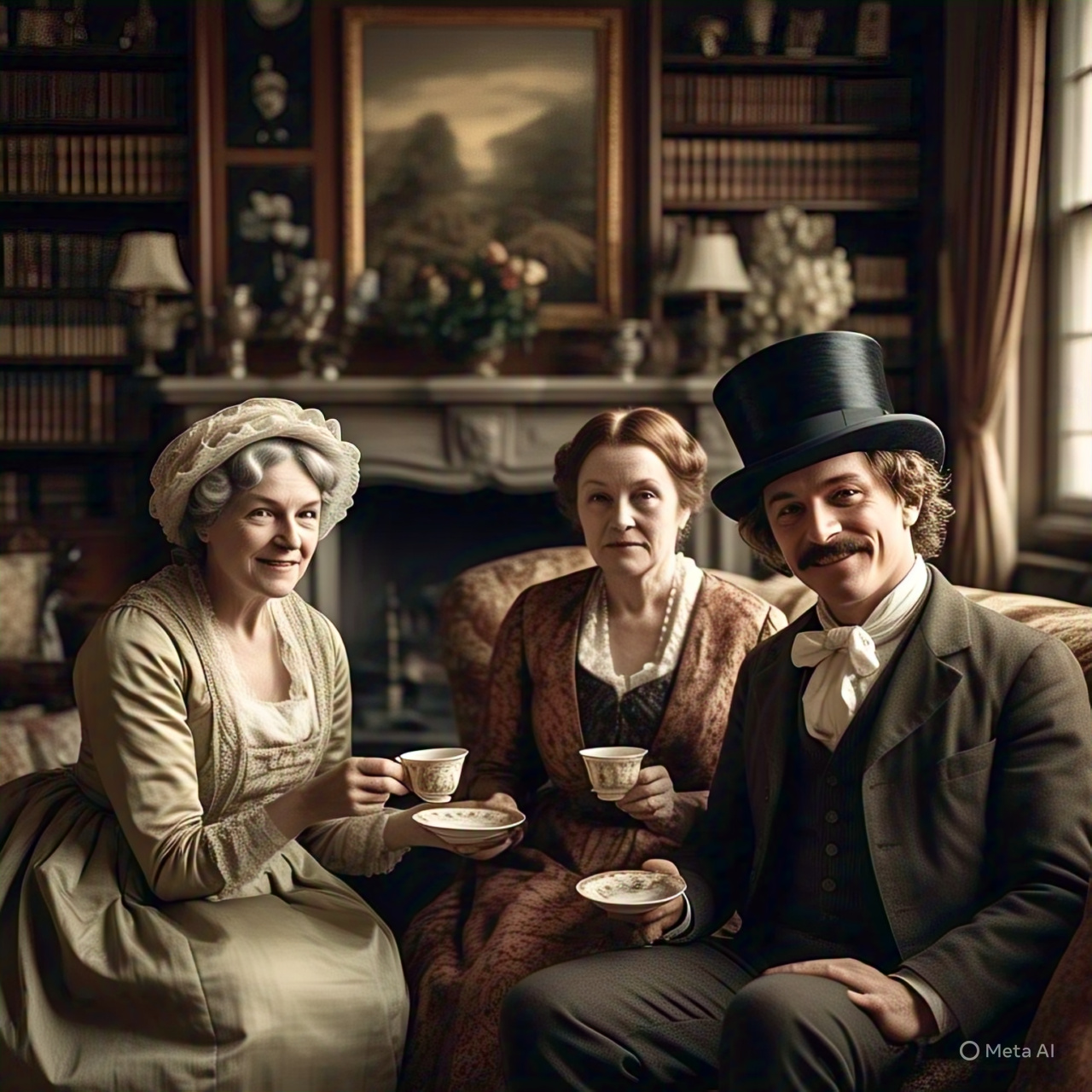Massachusetts, 1865
The leaves flamed red and gold outside a modest cottage tucked behind a veil of quiet maples. The house bore an English air—delicate lace curtains, ivy snaking up its whitewashed exterior, and a brass knocker polished too often for a home with so few guests. Inside, Jane Austen, aged and sharp-eyed at eighty-nine, sat in her writing chair with a shawl wrapped around her thin shoulders. Her days of publication were long past, but her mind remained unclouded, her wit polished by silence and age.
A knock sounded at the door. She did not hurry. One did not, at her age. She opened it to find a tall man with unruly hair, sun-creased skin, and a smirk that had seen its share of saloons and sermons.
“Afternoon, ma’am,” he said, doffing his hat. “Samuel Clemens. I’m calling on the bookish folk around here. Thought you might like a look at something I’ve written.” He held out a bundle of papers.
“And what would that be, Mr. Clemens?” “A travelogue, of sorts. Humorous. Called The Innocents Abroad.”
“Humor?” she said, arching an eyebrow. “We could use more of that lately. Come in.”
He stepped inside, eyeing the room with curiosity. Books lined the walls. A fire crackled in a hearth trimmed with carved wood. “Nice place,” he said. “You live alone?”
“Alone enough.” She settled him into a chair and took the manuscript. Leafing through, she smiled faintly. “You mock with precision, Mr. Clemens. It’s a rare quality.”
“Well,” he said, adjusting in his seat, “someone’s got to poke holes in all this pomp and piety.”
“Indeed,” she replied. “Though it takes tact.”
“You sound like you know a thing or two about it.”
“I suppose I do. Jane Austen.”
He blinked. “Come again?”
“Pride and Prejudice. Sense and Sensibility. Emma. I imagine you’ve at least insulted one of them.”
Clemens sat up. “You can’t be. Jane Austen died almost fifty years ago.”
She poured tea, calm as a librarian in a thunderstorm. “The reports of my death are greatly exaggerated.”
He stared. Then laughed. “I’ll be damned. I said once I wanted to dig you up and beat you with your own shinbone over Mansfield Park.”
“And now you have the opportunity,” she said, passing him a cup.
He took it, bemused. “You’re not what I expected.”
“Nor are you. But your voice is clear. It carries. With refinement, you could stir more than laughter. You might even change something.”
“You think so?”
“I know so.” They sipped tea beneath the hush of autumn wind. The fire danced. Outside, the world changed. Inside, two ghosts of literature—one presumed dead, the other not yet born to fame—shared stories, wit, and the strange comfort of being understood.
Before leaving, Clemens asked her to sign his copy of Emma. “Proof I drank tea with a ghost,” he said.
She smiled. “And I with a man who will haunt libraries long after he’s gone.”
He stepped out into the evening, the manuscript under his arm and a bemused grin still playing on his lips.
The door had scarcely closed behind him when it opened again, this time without a knock.
Charlotte Brontë stepped inside, cheeks pink from the crisp air, a basket of vegetables on her arm. She unwound her scarf with practiced ease and gave Jane a sideways glance.
“You had company.”
“A curious traveler,” Jane replied, returning to the teapot. “With a sharp tongue and a sharper mind.”
Charlotte set the basket down. “Did he insult your prose or mine?”
“Mine, for once. But I think he was more surprised to find me alive.”
Charlotte snorted. “We’re hardly alive. We’re inconveniently persistent.”
Jane offered her a fresh cup of tea.
“He left with your usual skepticism and one of my signed novels.”
Charlotte accepted the cup. “Another fool convinced the past is buried.”
They sat in silence for a moment, the fire crackling.
“You’ve lived with me five years now, Charlotte. Still convinced it was a mistake?”
“Undoubtedly,” Charlotte said, sipping. “But I’ve made worse ones.”
Jane smiled. “As have I. But they never stayed long enough to argue over the tea.”
Outside, the wind stirred the trees. Inside, two authors who never quite liked one another continued the strange truce of their cohabitation, bound by ink, exile, and a house too quiet to endure alone.

